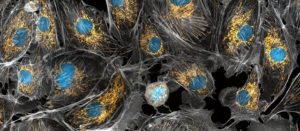The research team at RIKEN and Osaka University, led by Professors Watanabe, Kuratsune, and Kataoka, have been trying to get to the bottom of energy production – or lack thereof – since the early 1990s. In 2016 they published one of the first papers to examine the plasma metabolome in ME/CFS.
You can revisit this important paper here: https://www.ncbi.nlm.nih.gov/pubmed/27725700.
They found that ME/CFS patients had abnormalities in the TCA and urea cycle, two biochemical pathways that produce energy in the form of ATP. They noted that larger studies with more samples were the necessary next steps, so we reached out to them to collaborate. Before I tell you about the collaboration, let’s start with a refresher on the TCA and urea cycles!
Metabolism is the process of converting food and drink into energy to keep our body’s cells alive. Disturbances in metabolism results in too much or not enough of the substances needed for these vital chemical reactions. This can affect the function of organs- including the brain – and even the ability of the mitochondria to produce energy. The TCA cycle occurs in the mitochondria where through a series of chemical reactions energy is produced in the form of ATP. The urea cycle produces urea – which is excreted – from ammonia (NH3) which is toxic if not metabolized by the body. The urea cycle is an essential detoxification process that takes place predominately in the liver. Problems in the urea cycle result in the buildup of toxic chemicals that can affect the function of the liver as well as other cells and organs.
We formalized our partnership in 2017 (through a Material Transfer Agreement), they sent us a specific type of blood collection tube containing disodium EDTA and we collected and sent them 170 blood samples from ME/CFS patients and healthy volunteers. Fast forward to 2019 and the results are in. They used the same method called capillary electrophoresis time-of-flight mass spectrometry (CE-TOFMS) and focused on the alterations of metabolite concentrations on the TCA and urea cycles.
Female patients exhibited abnormalities in TCA and urea cycles, compared with male patients and certain metabolites discriminated female patients with ME/CFS from female healthy volunteers. These results are in line with the results from the Japanese samples showing dysregulation of TCA and urea cycles. Importantly, these findings will help to determine the utility of metabolomic biomarkers for ME/CFS.
If this content has been useful to you or a loved one, we invite you to, explore our online library, and subscribe to our monthly newsletter. We thank you for your continued support as we press forward in our vision to create a world where patients with ME/CFS and FM are readily diagnosed, effectively treated, and widely met with empathy and understanding.
Please consider making a donation to BHC, a 501 (c)3 nonprofit organization today.


 Lucinda Bateman, MD, is a renowned clinician, researcher, and educator. Her Johns Hopkins University Medical School training instilled an approach to care that she has employed throughout her career - the patient comes first and the unknown or unexplained does not equate to a lack of proper and compassionate care. Since starting her own practice in 2000, she has served on six boards or committees, been the principal investigator for 45 studies, authored/coauthored 40 journal articles, served as adjunct instructor and adjunct assistant professor in the University of Utah Departments of Preventative Medicine, Internal Medicine, and Anesthesiology, and lectured around the world.
Lucinda Bateman, MD, is a renowned clinician, researcher, and educator. Her Johns Hopkins University Medical School training instilled an approach to care that she has employed throughout her career - the patient comes first and the unknown or unexplained does not equate to a lack of proper and compassionate care. Since starting her own practice in 2000, she has served on six boards or committees, been the principal investigator for 45 studies, authored/coauthored 40 journal articles, served as adjunct instructor and adjunct assistant professor in the University of Utah Departments of Preventative Medicine, Internal Medicine, and Anesthesiology, and lectured around the world.